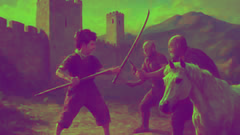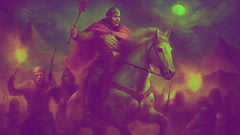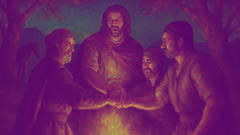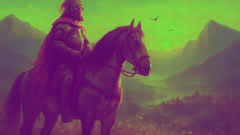Introduction
In the heart of the Balkans, where emerald mountains embrace rolling rivers and wildflowers scatter across ancient meadows, there once thrived a world brimming with tales of giants and heroes. Among these, none shines brighter than the legend of Prince Marko—a figure whose shadow still stretches across the hills and valleys of Serbia, Macedonia, and Montenegro. His name, whispered in song and poem, evokes courage, loyalty, and the kind of strength that could stir both awe and hope in the hearts of villagers gathered around glowing hearths. Marko Kraljevic, as he was known in the old tongue, lived in a land under threat, where the dawn often broke with the sound of hooves and the wind carried rumors of Ottoman banners unfurling on distant horizons. Yet, Marko was not simply a warrior; he was a son, a friend, and a symbol of the unbroken spirit of his people. His horse, Šarac, was said to be as mighty as any steed in fable, while his mighty mace—wielded with uncanny skill—became legend in its own right. The people looked to him not only for salvation in battle but also for justice, compassion, and laughter in darker times. His journey is more than a chronicle of wars; it’s a tapestry woven from the threads of honor, sacrifice, and a love for the land that could not be conquered by any sword. Through storm-swept nights and sun-drenched plains, Marko’s saga unfolds with vibrant color: duels on misty bridges, oaths exchanged beneath ancient oaks, secret councils in torchlit chambers, and moments of gentle kindness that soften even the hardest edge of steel. What follows is not just a story of resistance, but of legacy—the enduring flame that Marko left behind, warming generations to come.
The Roots of a Hero
Marko Kraljevic was born in the shadow of Prilep’s ancient fortress, the son of King Vukašin and Queen Jevrosima. As a child, Marko was restless—drawn to the clang of blacksmiths’ hammers, the stories of old warriors, and the wild, open fields where wolves howled beneath the stars. His earliest memories were laced with both love and loss; his mother’s gentle songs, his father’s stern lessons, and the whispers of war on the borderlands shaped his heart into something both fierce and tender.

By his twelfth year, Marko was already famed for his strength. Village children watched in awe as he lifted barrels no grown man could budge. When bandits threatened his home, it was Marko—still a boy—who stood in the breach, swinging a wooden staff with such determination that even the eldest warriors took notice. King Vukašin, seeing the spark in his son, called for tutors from distant cities. Marko learned to read the old Cyrillic script, to debate matters of justice, and to measure a man not by his gold but by his word. Yet, he never lost his love for the wild: he hunted in the deep forests, learned the ways of the falcon and wolf, and spent hours talking to travelers who brought tales from Constantinople to Ragusa.
Prilep in those days was a city poised between hope and dread. The markets bustled with traders selling silks and spices, yet the city walls were being fortified each season. The encroaching power of the Ottoman Turks was an ever-present shadow. Marko grew up hearing both the laughter of feasts and the quiet sobs of those who lost loved ones in border raids. He vowed early on that he would not abandon his people, no matter the cost.
As Marko entered manhood, his legendary horse Šarac entered his life. The story went that Šarac was no ordinary steed but a mystical creature born of mountain wind and river mist. On a stormy night, as thunder rolled across the plains, Marko found Šarac tangled in a hunter’s snare. Freeing the trembling horse, Marko spoke gentle words and offered the beast a crust of bread. From that night on, horse and rider were inseparable, their bond forged in trust and mutual respect.
The mace came next—a weapon so heavy that three men together struggled to lift it. The king’s smiths fashioned it from the ore of Mount Zlatibor, its head crowned with silver studs and inlaid with symbols of the sun and crescent moon. It became Marko’s signature, both in battle and in legend. When he rode into villages threatened by marauders, the mere sight of his mace slung across his back sent chills through the bravest foes.
Yet, Marko’s heroism was not only in his arms. He was known for helping the weak, breaking up quarrels in the market square, and ensuring that orphans and widows had bread in winter. He listened to old women’s grievances with the same attention he gave to council meetings. His laughter—rich and deep—was said to lift spirits even on the darkest days.
When word finally came that King Vukašin would march to Kosovo Polje to join the coalition against the Ottomans, Marko stood by his father’s side. But fate dealt a heavy blow: the Battle of Maritsa left the king dead and Marko the reluctant heir to a land threatened on all sides. The night he learned of his father’s fall, Marko wept beneath the stars, swearing an oath that he would never let his people’s spirit break—even if their borders fell.
From that moment, Marko’s destiny was set. He would carry the hopes of the Balkans on his broad shoulders, riding out at dawn not only as a prince, but as a symbol—a living legend whose courage would echo through centuries.
Battles on the Edge of Empire
The years that followed tested Marko’s resolve like never before. With his father’s crown heavy on his brow and the Ottoman tide advancing, Marko became more than a ruler—he became a guardian. In the villages of Macedonia, in the forests of Kosovo, and across the sun-bleached hills of southern Serbia, his deeds grew into songs that traveled faster than any rider.

It began with small skirmishes. Ottoman raiding parties, quick and ruthless, would sweep into remote hamlets, snatching what they could before vanishing into the dusk. Marko’s strategy was patience and vigilance. He learned to read the land as if it were an open book: where rivers cut secret paths, where wild boar trails doubled as hidden routes for men, where villagers could take shelter in caves or ruined monasteries. He gathered a loyal band—men who’d lost homes, brothers, or sons to the invaders. Among them was Miloš the Tall, whose laughter echoed off mountains; Rade the Hawk-Eyed, famed for his skill with a bow; and old Vidoje, whose wisdom in herbs and wounds often meant the difference between life and death.
One autumn night, a scout arrived breathless at Marko’s camp with dire news: the Ottomans had seized the village of Veles, taking its people hostage and preparing to burn the fields before winter. Marko’s face hardened. He gathered his companions, their eyes burning with the fire of vengeance and justice. As they rode beneath a moonlit sky, Šarac’s hooves barely made a sound on the leaf-strewn path. The plan was swift and silent—a midnight assault from three sides, with the river at their backs as an escape route. Flames leapt into the sky as Marko crashed through the Ottoman lines, his mace swinging with the fury of a storm. The enemy, caught unprepared, broke ranks. By dawn, Veles was free, its people kneeling in gratitude at Marko’s feet.
But victory always came with a price. Marko buried friends and foes alike, their graves marked by simple stones. He visited widows with humble gifts, reminding them that their sorrow was shared by all. As the years wore on, Marko saw the world change around him. Some local lords—seeking survival—chose to bend the knee to Ottoman rule, paying tribute in gold and men. Others clung to hope, joining Marko in guerrilla resistance from mountain strongholds. For Marko, there was never a choice. His code was simple: stand for those who could not stand for themselves, and let no tyrant rest easy so long as he drew breath.
Yet, it was not all war. Marko forged alliances with neighboring princes and outlaws alike. He attended weddings and funerals with equal sincerity, bringing hope simply by his presence. It was said that when Marko entered a room—his massive frame filling the doorway—children and old men alike felt safer. He drank from the same cup as his soldiers, sharing stories and laughter around the campfire. His humor was legendary; he once tricked an Ottoman pasha into believing a herd of goats were enchanted warriors, saving an entire village from massacre.
Perhaps his most famous duel was on the stone bridge at Arbanasi, where he faced the giant Musa Kesedžija. Musa, known for his cruelty, had terrorized the borderlands for years. Their battle lasted from dawn till noon, with neither gaining the upper hand. At last, Marko’s patience and skill won out—he disarmed Musa and, rather than slaying him, offered mercy. Musa, stunned by such nobility, swore allegiance and became one of Marko’s most trusted companions.
Each victory and act of kindness wove Marko deeper into the fabric of his people’s dreams. The Ottomans grew wary of him; tales of his courage began to circulate even in distant Constantinople. Yet Marko knew no matter how many battles he won, peace would remain elusive. The tides of history were turning, and the true test of his legacy was yet to come.
The Unbreakable Oath
In the aftermath of countless battles, Prince Marko found himself changed—not just by scars and memories, but by an unbreakable oath that bound him to his land and people. The years wore heavy; his beard grew thick and streaked with grey, yet his eyes never lost their spark. Across the Balkans, stories spread of his mercy and his ferocity, often in the same breath.

With Ottoman power pressing closer every year, many wondered how long Marko could hold out. Sultans sent envoys bearing rich gifts and veiled threats. Some offered gold, others promised titles or a peaceful retirement in distant cities. Marko always refused. 'A prince cannot sell his people’s honor,' he’d reply. To every offer of peace on Ottoman terms, he answered with defiance—or with cunning. On one occasion, Marko agreed to deliver tribute to the Sultan himself. Arriving in Skopje’s bustling bazaar with sacks of coin, he distributed the gold among beggars and orphans before ever reaching the palace. When the Sultan’s men complained, Marko shrugged. 'You asked for tribute from my land; these are my people.' The tale quickly became legend, and even some among the Ottomans couldn’t help but admire him.
But not all enemies came from outside. Jealous neighbors whispered that Marko’s days were numbered; greedy lords plotted in candlelit halls. Yet he always seemed to know their schemes. His spies were loyal not out of fear, but respect. When confronted by treachery, Marko often chose exile over execution—a mercy rare in those bloody days. More than once, men who’d plotted against him returned seeking forgiveness and a place at his table. Marko welcomed them back, believing that unity was worth more than vengeance.
Marko’s heart, too, was not immune to longing. The princesses of distant lands sent him embroidered handkerchiefs and shy glances during festivals, but Marko’s true love was Mirjana, a healer’s daughter from a humble village. Their meetings were secret, held beneath the willow trees by moonlight or among wildflowers after battles. Mirjana taught Marko patience and hope—how to find beauty in small things, even as the world threatened to crumble. It was said that she alone could calm his storms of rage or bring laughter to his lips after nights of loss.
One bitter winter, famine struck the region. Marko rode from village to village, distributing food from his own stores. He worked alongside peasants in the fields, broke up loaves of bread for starving children, and comforted the old and sick. When a plague swept through Prilep, Marko himself fell ill. For days he lay delirious, watched over by Mirjana and his loyal friends. Word spread that even death could not claim him; when he finally rose from his sickbed, the people celebrated with feasts and music lasting three days.
But Marko knew his strength was not infinite. As the Ottomans tightened their grip and allies grew scarce, he gathered his closest friends for one last council. By firelight, they spoke not of war but of legacy. 'Our fight is not only for ourselves,' Marko told them, 'but for those who come after. If we fall, let it be said that we stood together—never bending, never breaking.' Each man swore an oath: to guard their land as long as breath remained, to teach their children the songs of freedom, and to remember that courage is not the absence of fear, but its mastery.
With that oath, Marko’s legend was sealed. His deeds became stories, his words became proverbs, and his example became a guiding star for generations yet unborn. Even as the storm clouds gathered, the people of the Balkans knew they would never truly be conquered—not while they carried Marko’s unbreakable oath in their hearts.
Conclusion
Prince Marko’s tale endures because it speaks to something timeless—the conviction that courage and compassion can hold back even the darkest tides. Though the world he knew has vanished beneath centuries of change, his spirit lingers wherever people fight for justice or gather to share bread and stories. In every hidden valley where wildflowers bloom, in every ruined fortress echoing with children’s laughter, the legend of Marko Kraljevic still rides at dawn. His life was not just a chain of battles, but a beacon: proof that even when hope seems lost, a single heart can inspire a nation. The villagers who once huddled in fear now recall him with pride; his laughter, his mercy, and his indomitable will remain a testament to all who cherish freedom. So long as songs are sung by firesides and oaths are made beneath open skies, the epic of Prince Marko will live on—an unbroken thread binding past to future, hero to homeland.













